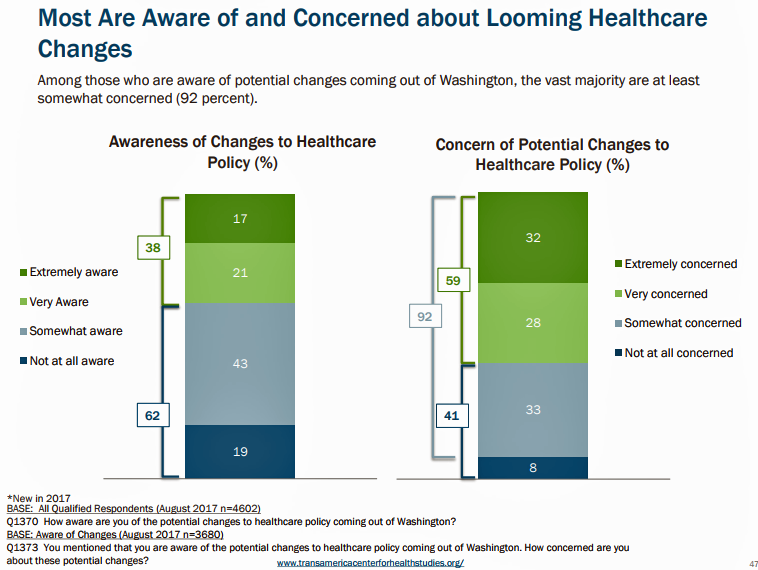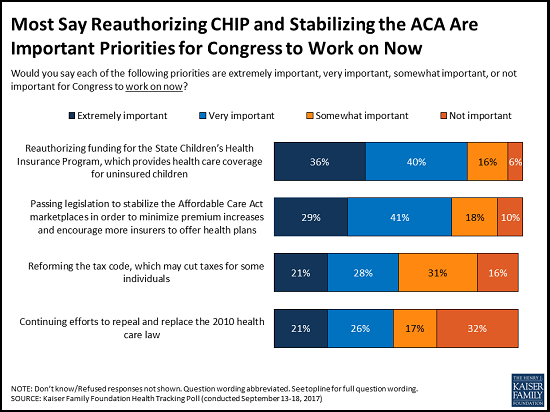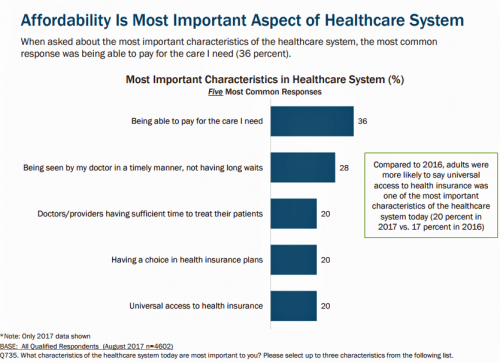4 in 5 Americans are aware of potential changes to healthcare policy brewing in Washington, DC. 92% of them are concerned about those changes, according to Healthcare Consumers in a Time of Uncertainty, the fifth annual survey from Transamerica Center for Health Studies.

Peoples’ most-shared fears are losing their coverage for pre-existing conditions, out-of-pocket spending, and a ban on lifetime limits.
That boils down to one thing: cost. That is, cost, for having to spend money on services not-covered by their health insurance plan; cost for out-of-pocket items under-insured, denied, or requiring coinsurance or co-payments; and, catastrophic costs that rise beyond a pre-determined limit. This is a rational response from health consumers who have experienced more denials of healthcare, noted in this recent report from The Doctor-Patient Rights Project.

With Americans saying that the ability to pay for healthcare as the most important feature of a healthcare system (shown in the second chart), peoples’ inability to pay for healthcare costs was #3 on their personal stress meters: 72% of people worry about money in general, 64% about the economy, and 62% about healthcare costs.
Note, too, that cost (“being able to pay for the care that I need”), is more important to people than being seen by my doctor in a timely manner, sufficient time to be with my provider, having a choice in plans, or providing universal access to insurance.
There are other issues covered in this survey, which paints a picture of Americans worried about the vague future of their health care system.
Transamerica conducted this study with the Harris Poll among 4,602 U.S. adults 18 to 64 years of age in August 2017. Respondents were privately insured (2,888), publicly insured (1,009) and uninsured (449).
 Health Populi’s Hot Points: Most Americans wanted the Federal government to stabilize the Affordable Care Act health insurance marketplaces and to reauthorize CHIP, the Children’s Health Insurance Program, based on September’s Health Tracking Poll from the Kaiser Family Foundation.
Health Populi’s Hot Points: Most Americans wanted the Federal government to stabilize the Affordable Care Act health insurance marketplaces and to reauthorize CHIP, the Children’s Health Insurance Program, based on September’s Health Tracking Poll from the Kaiser Family Foundation.
This past week, President Trump signed an executive order to de-fund health insurance subsidies for people seeking coverage for individual insurance on health insurance exchanges, a centerpiece of the ACA. Furthermore, as of Friday 13 October, Congress had yet to reauthorize CHIP, the kids’ health insurance program. CHIP has been generally accepted as a successful health plan for kids’ health in the U.S., so the lack of getting-to-yes in Congress points to “how debilitated our political system has become,” in the words of Robert Schlesinger, US News & World Report’s editor.
CHIP was created in a bipartisan fashion between Senator Edward Kennedy (Democrat) and Senator Orrin Hatch (Republican).
In the meantime, every major health care provider organization has expressed their opposition to the President’s executive order, which goes against the down vote for the so-called “skinny repeal” earlier this year.
Americans are right to be concerned about the state of health reform efforts in the nation. 70% of the public told the Kaiser poll that stabilizing the ACA was very or extremely important, with an additional 18% noting it was “somewhat” important. That adds up to 9 in 10 Americans who believe it’s important to stabilize the ACA’s health insurance marketplaces.
Never has the chasm between the “inside-the-Beltway” Legislative and Executive branches been at such odds with the American public as in this moment for rational healthcare reform.





 I'm in amazing company here with other #digitalhealth innovators, thinkers and doers. Thank you to Cristian Cortez Fernandez and Zallud for this recognition; I'm grateful.
I'm in amazing company here with other #digitalhealth innovators, thinkers and doers. Thank you to Cristian Cortez Fernandez and Zallud for this recognition; I'm grateful. Jane was named as a member of the AHIP 2024 Advisory Board, joining some valued colleagues to prepare for the challenges and opportunities facing health plans, systems, and other industry stakeholders.
Jane was named as a member of the AHIP 2024 Advisory Board, joining some valued colleagues to prepare for the challenges and opportunities facing health plans, systems, and other industry stakeholders.  Join Jane at AHIP's annual meeting in Las Vegas: I'll be speaking, moderating a panel, and providing thought leadership on health consumers and bolstering equity, empowerment, and self-care.
Join Jane at AHIP's annual meeting in Las Vegas: I'll be speaking, moderating a panel, and providing thought leadership on health consumers and bolstering equity, empowerment, and self-care.